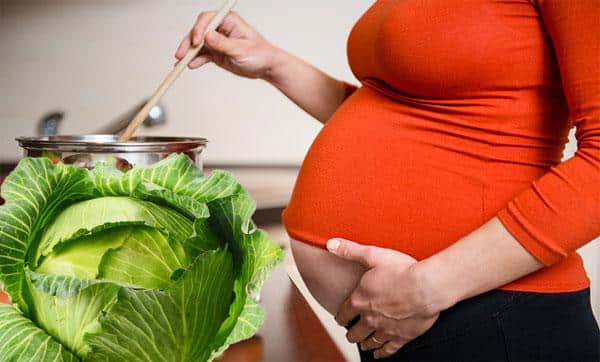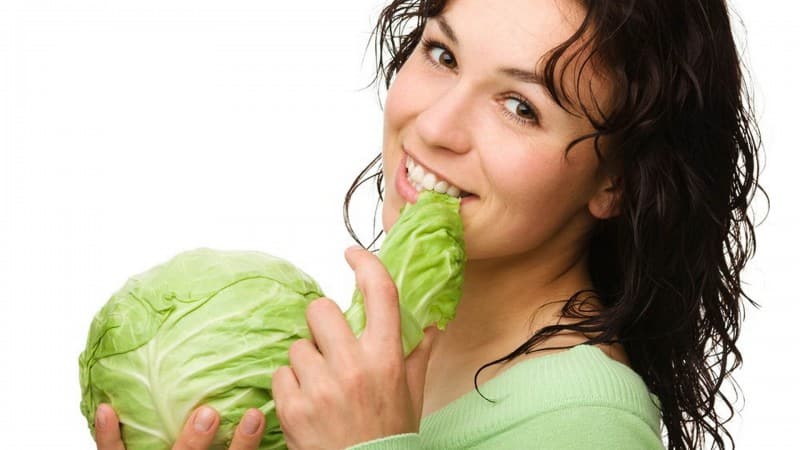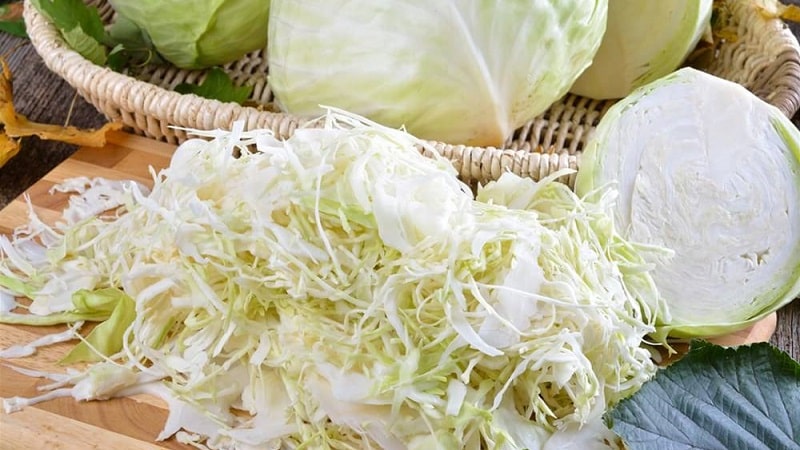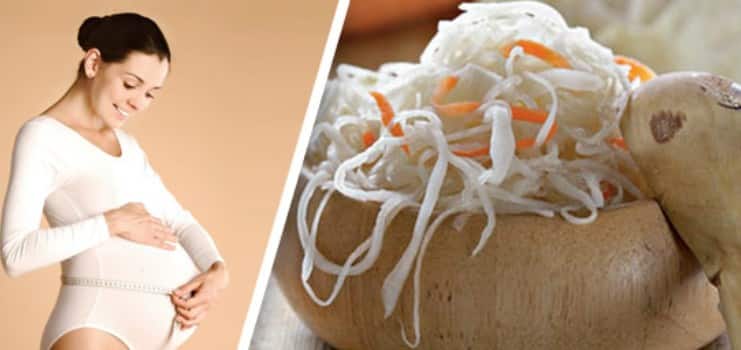Is it possible to eat cabbage during pregnancy?
It is important for a pregnant woman to pay special attention to her diet to prevent a deficiency of minerals and vitamins. Experts advise expectant mothers to eat as many vegetables as possible, providing the body with useful components. Cabbage ranks high on the recommended list.
Can pregnant women eat cabbage?
It is recommended to eat cabbage during pregnancy, but in moderation and in the absence of contraindications.
Fresh

Unprocessed vegetables contain the most nutrients. Can pregnant women eat fresh cabbage? Yes, you can - moreover, its use is relevant throughout the entire period of bearing a child.
In the first trimester, vegetables are beneficial due to folic acid. It participates in the formation of the fetal neural tube and prevents the development of defects of the nervous system.
Reference! The most folic acid (41% of the daily value per 100 g) is found in cauliflower, the least (7%) in red cabbage.
A pregnant woman's need for iron and calcium increases several times - all types of vegetables contain them. Thanks to vitamin C in the composition, the expectant mother strengthens her weakened immune system. Vitamin K, which is especially rich in white and red cabbage and broccoli, prevents unwanted bleeding. Potassium removes excess fluid from the body and helps relieve swelling.
This is a valuable, but low-calorie product, so it allows you to keep your weight normal. Values per 100 g for different types of vegetables:
- broccoli - 34 kcal;
- colored - 30 kcal;
- red cabbage - 26 kcal;
- white cabbage - 25–28 kcal;
- Beijing - 16 kcal.
Starting from the 25th week, when pregnancy enters the third phase, the size of the fetus rapidly increases. Because of this, the pressure on the mother’s internal organs is felt more intensely. Such processes sometimes provoke constipation, which is undesirable for a pregnant woman. Eating fresh cabbage salads will help prevent them.
Stewed
Stewed cabbage - An excellent remedy for swelling. It is recommended not to add salt to the dish. You are allowed to drink it in unlimited quantities: the fiber will still absorb all the excess. As a result, the expectant mother will no longer need to take additional diuretics.
The stew is easily digestible, which is important for women with digestive problems. An interesting option is a mix of white cabbage, cauliflower and broccoli. A large amount of protein in such a dish saturates the body, while not rewarding with unnecessary calories.
Although some nutrients are lost during cooking, beta-carotene, vitamins K, B vitamins and minerals are mostly retained, making stewed cabbage almost as valuable to eat as fresh cabbage.
Pickled
Eating pickled cabbage during pregnancy it is allowed, but with a moderate content of salt and vinegar, which provoke swelling and heartburn, respectively.
The sour product helps cope with the symptoms of early toxicosis, strengthens the nervous system and improves metabolism. When a woman craves something salty or sour in the first trimester, pickled cabbage ideally satisfies her taste buds.
Moderate consumption of the dish compensates for the deficiency of salt and vitamins, and thanks to the content of folic acid, it helps to avoid disturbances in the development of the child’s nervous system.
The benefits of cabbage for pregnant women

There are more than 100 varieties and varieties of vegetables, each valuable in its own way and has a rich taste. Let's look at the most popular crops.
Colored
Such a vegetable recommended for pregnant women. It retains its properties and pleasant taste best when stewed.
The rich composition of cauliflower and its benefits during pregnancy:
- folic acid (41% of the daily value of 100 g) is involved in the development of the baby’s brain and the formation of the placenta;
- vitamin B6 (8%) helps in normal embryonic growth and cell reproduction;
- vitamin C (100%) strengthens the woman’s body’s defenses and acts as an antioxidant;
- calcium (3%) supports the child’s developing bones and teeth normally;
- sulfur (8.5%) removes toxins;
- potassium (8%) prevents muscle spasms in the expectant mother, strengthens the heart;
- sodium (1%) together with potassium are natural electrolytes that maintain normal water balance;
- vitamin K (13%) prevents bleeding;
- iron (8%) prevents anemia;
- niacin (5%) is involved in the formation of the skin, digestive and nervous systems of the unborn child;
- fiber (12%) normalizes intestinal function, prevents constipation, and improves bile secretion.
Beijing
Chinese cabbage very useful for expectant mothers, especially in its raw form - in salads, seasoned with sour cream or vegetable oil.
Thanks to the iron in the composition (1.7% of the norm), the product prevents anemia, fights drowsiness, increases the overall tone of the body, normalizes blood pressure, and strengthens nails.
Folic acid (20%) prevents the appearance of birth defects in the fetus.
Vitamin B6 (11.6%) is important for the nervous system and is involved in the metabolism of amino acids and lipids.
Reference! The vegetable is rich in vitamins C (30%), K (36%).
By consuming Chinese cabbage, a pregnant woman satisfies the feeling of hunger, saturates the body with valuable elements, and does not gain extra pounds.
White cabbage

This type of cabbage is allowed to be consumed on a daily basis, and only 200 g per day provides 100% of the need for vitamin C.
Benefits of the vegetable:
- When dietary fiber enters the stomach, it increases in size, which provides a feeling of fullness and helps control the amount of food eaten.
- Vitamins B, C, E, K, PP, U in cabbage strengthen blood vessels, reduce fatigue, relieve irritability, and reduce the risk of cancer.
- Folic acid (24% of the norm) is involved in the normal formation of the fetal neural tube.
- Potassium, calcium, iron, sodium, fluorine, zinc, manganese, magnesium, phosphorus normalize the functioning of the heart muscle and blood vessels, participate in the normal construction of the skeleton, strengthen teeth, nails and hair, and support the immune system.
Red cabbage
Red cabbage contains a pigment called anthocyanin. It improves the functioning of the cardiovascular system and has antioxidant properties. The vegetable helps in the fight against toxicosis, prolongs youth and beauty.
Important! Heat-treated red cabbage loses some of its beneficial properties, so it is better to eat it raw. It is recommended to chop the leaves as thinly as possible, since their structure is stiffer than that of cabbage leaves.
The vegetable contains phytoncides, which are known for antibacterial properties.Selenium (1.5% of the norm per 100 g) is involved in metabolic processes, fiber (10%) normalizes digestion. Silicon (93%) strengthens hair, reduces fatigue, and is important for the absorption of other microelements.
Red cabbage also contains:
- minerals: potassium, calcium, magnesium, iron, manganese;
- vitamins: C, K, group B, beta-carotene.
Broccoli

Broccoli is rich in protein (5% DV) and beta-carotene (7%), vitamins C (99%), K (85%), silicon (260%) and boron (264%). Lutein and zeaxanthin (23%) support vision.
Reference! Broccoli broth contains purines, which, when consumed in large quantities, pose a risk of gout. The vegetable itself is eaten and the broth is drained.
Beneficial properties of broccoli:
- exhibits an antibacterial effect;
- restores salt balance in the body of the expectant mother;
- prevents constipation;
- strengthens the nervous and immune systems;
- helps in the normal structure of the fetal skeleton, its nervous system and blood formation.
Restrictions and contraindications

Eating cabbage is not contraindicated for pregnant women, but in some cases it is better to limit it:
- Pickled the vegetable can cause swelling if the expectant mother has a predisposition.
- It is better to prefer stewed cabbage to fresh cabbage if you have problems with the gastrointestinal tract (gastritis or ulcers, pancreatitis), liver disease, or problems with the thyroid gland.
- Since the vegetable causes increased gas formation, it is consumed with caution by those for whom this fact causes discomfort.
- If you have kidney disease, problems with the respiratory system, hypertension, high acidity of the stomach, or intestinal spasms, cabbage is eaten in minimal quantities or excluded from the diet.
It is believed that the more products a woman tries during pregnancy, the less prone the baby will be to allergies: all products will be familiar to him from the womb.
Conclusion
The presence of all types of cabbage is desirable in the diet of the expectant mother. It's best to alternate or combine vegetables to get the most benefits. White and red cabbage, Chinese cabbage, broccoli are sources of fiber, vitamins C and K, cauliflower will compensate for the lack of silicon, ascorbic acid and boron, omega-3 fatty acids.